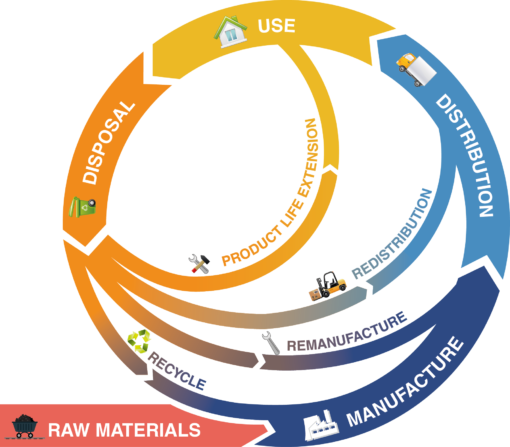 An issue of great topicality and media interest that characterizes this period and exerts a strong impact on our life and on the companies’ management concerns the sustainability and the Green Economy. The themes of the Green Economy and of the Circular Economy, in fact, are increasingly recurring and the European Directive of 2014 deems the Green Economy and the Circular Economy as a governance model able to grant a sustainable growth for the European Union and the entire world. The Green Economy, in particular, is defined as “a system of economic activities connected with the production, distribution and consumption of goods and services that results in a better human wellbeing in the long term, to avoid exposing the future generations to significant environmental risks and to the ecologic shortage”, while the circular economy represents “a development strategy that provides for the economic growth without increasing the consumption of resources and reducing the impact on the environment”. The fundamental target to be reached is thinking again manufacturing systems and intervening on citizens’ consumption habits through the technological, social and organizational innovation, then relying on a global involvement of multi-stakeholders. According to the new approach, products will be characterized by a longer service life, at the end of which the resources that constituted it must be reused inside new manufacturing cycles to create new value; this allows drastically decreasing the production of wastes. To implement a circular economy, the starting point is a new design of manufacturing processes, of products and services. They must be redesigned to assure a longer durability of the item, easy repair, a possibility of re-working and upgrading, a massive recycling of components and raw materials before the end of their service life. As the proposed image shows, the entire value chain should be revised and reconceived, starting from the use of raw materials, up to the technological innovation applied to the production, to the development of efficient distribution systems, to a more responsible product use up to its recycling. Recycling, in particular, exerts an important effect on all the elements of the value chain. It influences, in fact, the use of raw materials by supplying recycled material and some natural resources, it modifies the manufacturing processes and the distribution chain and, finally, it contributes in determining a longer service life of products. Therefore, we need a real change and a strong bent for innovation, able to involve technological, organizational, behavioural and regulatory ambits and to devise new relationship models between enterprises and consumers, in a horizon that extends to the medium-long term. Europe wishes the implementation of a circular economy model through the involvement of citizens and enterprises to reach the targets of zero waste, zero urban emissions and of material recycling practices. In this phase, will be awarded the initiatives of businesses that aim at the redesign of transformation processes, at reviewing business models and at favouring the formation of a market for sustainable products and services, supporting and boosting green policies.
An issue of great topicality and media interest that characterizes this period and exerts a strong impact on our life and on the companies’ management concerns the sustainability and the Green Economy. The themes of the Green Economy and of the Circular Economy, in fact, are increasingly recurring and the European Directive of 2014 deems the Green Economy and the Circular Economy as a governance model able to grant a sustainable growth for the European Union and the entire world. The Green Economy, in particular, is defined as “a system of economic activities connected with the production, distribution and consumption of goods and services that results in a better human wellbeing in the long term, to avoid exposing the future generations to significant environmental risks and to the ecologic shortage”, while the circular economy represents “a development strategy that provides for the economic growth without increasing the consumption of resources and reducing the impact on the environment”. The fundamental target to be reached is thinking again manufacturing systems and intervening on citizens’ consumption habits through the technological, social and organizational innovation, then relying on a global involvement of multi-stakeholders. According to the new approach, products will be characterized by a longer service life, at the end of which the resources that constituted it must be reused inside new manufacturing cycles to create new value; this allows drastically decreasing the production of wastes. To implement a circular economy, the starting point is a new design of manufacturing processes, of products and services. They must be redesigned to assure a longer durability of the item, easy repair, a possibility of re-working and upgrading, a massive recycling of components and raw materials before the end of their service life. As the proposed image shows, the entire value chain should be revised and reconceived, starting from the use of raw materials, up to the technological innovation applied to the production, to the development of efficient distribution systems, to a more responsible product use up to its recycling. Recycling, in particular, exerts an important effect on all the elements of the value chain. It influences, in fact, the use of raw materials by supplying recycled material and some natural resources, it modifies the manufacturing processes and the distribution chain and, finally, it contributes in determining a longer service life of products. Therefore, we need a real change and a strong bent for innovation, able to involve technological, organizational, behavioural and regulatory ambits and to devise new relationship models between enterprises and consumers, in a horizon that extends to the medium-long term. Europe wishes the implementation of a circular economy model through the involvement of citizens and enterprises to reach the targets of zero waste, zero urban emissions and of material recycling practices. In this phase, will be awarded the initiatives of businesses that aim at the redesign of transformation processes, at reviewing business models and at favouring the formation of a market for sustainable products and services, supporting and boosting green policies.
Elisabetta Ceretti



